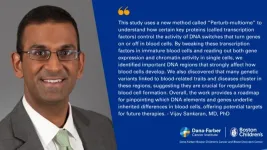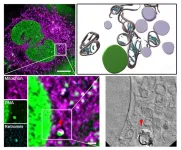(Press-News.org) The erosion of democracy in the U.S. has been a topic of concern in recent years, especially after protesters stormed the U.S. Capitol on Jan. 6, 2021, in an attempt to block the certification of Joe Biden's election as president. Most of the academic studies on democratic backsliding, however, have focused on public opinion within the U.S. and have not looked at global public opinion.
How favorably others view the U.S. is part of the country's "soft power"—a term coined by Joseph Nye at Harvard University in the 1980s. It refers to a country's ability to influence other countries’ policy decisions toward them through attraction rather than coercion. According to Nye, one of a country's soft power resources is democracy, so how others view U.S. democracy may affect how willing they are to cooperate with the U.S. on foreign policy.
A team of researchers from Dartmouth, the Australian National University, and Florida State University set out to examine how democratic backsliding in the U.S. may affect people's views toward the U.S. Through a series of survey experiments conducted in 2023 and 2024—all before Donald Trump won a second term in office—they obtained data from more than 11,800 participants in 12 other democracies throughout North America, Europe, Asia, and Oceania. The findings are published in PNAS Nexus.
In the spring of 2023, participants in Australia, Canada, France, Germany, the Netherlands, New Zealand, Norway, Sweden, and the United Kingdom evaluated how unfavorably or favorably they viewed the U.S. on a four-point scale. Half of the respondents received an overview of a hypothetical report on how democracy is declining in the U.S. before they were asked to rate how favorably they viewed the U.S. while the other half received no information beforehand. While the summary of the report mentioned the Jan. 6 attack at the U.S. Capitol without mentioning Trump by name, the report also included other concerns about U.S. democratic backsliding, such as new laws that could make it harder for some groups of people to vote.
The researchers intentionally designed this hypothetical report to evaluate how information about democratic backsliding affects people's attitudes, independent of who the president is. In other words, their goal was to understand how people respond to negative views of U.S. democracy, not those of a particular president.
The second and third surveys were administered in New Zealand in July 2023 and in Japan, India, and South Korea in February 2024. The research team selected the four countries because they are key U.S. partners in the Indo-Pacific. In these studies, respondents in the "treatment" group received either the democratic backsliding information, the same as the report used in the first study, or a summary of a hypothetical report on how the U.S. economy is declining. Respondents in the control group received neither. All participants were then asked to evaluate their favorability toward the U.S. In addition, they also answered questions about their policy preferences toward the U.S.
Across all three surveys, the results showed that respondents who received the information about the democratic backsliding report had a less favorable view of the U.S.
Yet, contrary to the research team's expectations, democratic backsliding did not reduce public support for cooperation policies with the U.S., a stark contradiction to Nye's theory of soft power.
"Our findings demonstrate that when it comes to international public opinion, a country's attractiveness does not necessarily change people's policy preferences," says co-author Yusaku Horiuchi, a professor of government and the Mitsui Professor of Japanese Studies at Dartmouth. "If the study, however, were to be repeated now under President Trump's second term, it would be interesting to see if the results may be any different."
However, the co-authors add that in the current context, it would be especially difficult to distinguish between how global public opinion has changed due to U.S. democratic backsliding or the Trump administration’s policies. "Our study is unique because we show the effects of changes in American democracy before the leadership change," says Horiuchi.
The results also showed that participants' favorability toward the U.S. was not reduced when they received hypothetical information reporting on the U.S. economy's declining performance. This finding demonstrates that an economic downturn does not influence global public opinion while U.S. democratic decline does.
"Understanding how citizens of democracies view each other—or in this case view the U.S.—holds relevance for the future of U.S. foreign policy," says co-author Kathleen Powers, an associate professor of government and faculty coordinator for the War & Peace Fellows Program at the Dickey Center for International Understanding. "We did not find evidence that democratic backsliding reduced support for international cooperation, but the declining image of the U.S. could be an early indicator of whether there will be sustained support."
Horiuchi's long-time collaborators Benjamin Goldsmith at the Australia National University and Kelly Matush, a former post-doctoral fellow at the Dickey Center now at Florida State University, also contributed equally to the study.
The researchers have other studies underway examining democratic solidarity—whether democracies support another democracy in conflict—and how foreign policy opinion shifts when major political change occurs within a country.
Horiuchi is available for comment at: Yusaku.Horiuchi@dartmouth.edu.
###
END
Study assesses U.S. image amid weakening of democracy
Survey finds global partners' views of U.S. dimmed but policy support remained
2025-04-04
ELSE PRESS RELEASES FROM THIS DATE:
Two scientific researchers to receive 2025 Ralph L. Sacco Scholarships for Brain Health
2025-04-04
DALLAS and MINNEAPOLIS, April 4, 2025 — The American Academy of Neurology and the American Heart Association have awarded the 2025 Ralph L. Sacco Scholarships for Brain Health to two researchers, Hortense Triniac, Ph.D., of Milwaukee and Katy Walsh, Ph.D., of Boston. Each will receive a $150,000 two-year scholarship to support continuing scientific research in brain health. This is the second year this scholarship has been awarded.
The Ralph L. Sacco Scholarships in Brain Health, also known as the Sacco Scholars program, are made possible by a generous bequest to the American Academy of Neurology, the world’s largest association of neurologists ...
Researchers improve chemical reaction that underpins products from foods to fuels
2025-04-04
CORVALLIS, Ore. – A chemical reaction that’s vital to a range of commercial and industrial goods may soon be initiated more effectively and less expensively thanks to a collaboration that included Oregon State University College of Engineering researchers.
The study, published in Nature, involves hydrogenation – adding the diatomic hydrogen molecule, H2, to other compounds.
“Hydrogenation is a critical and diverse reaction used to create food products, fuels, commodity chemicals and pharmaceuticals,” ...
Texas Tech to develop semiconductor power devices through $6 million grant
2025-04-04
Summary:
Texas Tech University’s Edward E. Whitacre Jr. College of Engineering has secured a $6 million U.S. Department of Defense grant to develop advanced semiconductor materials and devices, particularly for high-power electronics and optoelectronics. The project aims to enhance the performance of wide and ultra-wide bandgap semiconductors, leading to more reliable, high-performance electronics for military applications.
Why This Matters:
Technology Advancement: The research will improve the development of high-performance, high-power electronic devices critical for modern technologies.
Military/Defense Applications: The project targets key military systems, ...
Novel genomic screening tool enables precision reverse-engineering of genetic programming in cells
2025-04-04
RESEARCH SUMMARY
Novel genomic screening tool enables precision reverse-engineering of genetic programming in cells
Study Title: Transcription factor networks disproportionately enrich for heritability of blood cell phenotypes
Publication: Science
Corresponding Dana-Farber Cancer Institute authors: Alexis Caulier, MD, PhD, Vijay Sankaran, MD, PhD
Summary: Collaborative research led by investigators at Dana-Farber/Boston Children's Cancer and Blood Disorders Center defines a ...
Hot Schrödinger cat states created
2025-04-04
Quantum states can only be prepared and observed under highly controlled conditions. A research team from Innsbruck, Austria, has now succeeded in creating so-called hot Schrödinger cat states in a superconducting microwave resonator. The study, recently published in Science Advances, shows that quantum phenomena can also be observed and used in less perfect, warmer conditions.
Schrödinger cat states are a fascinating phenomenon in quantum physics in which a quantum object exists simultaneously in two different states. In Erwin Schrödinger's thought experiment, it is a cat that is alive ...
How cells repair their power plants
2025-04-04
Damage to the genetic material of mitochondria – the mitochondrial DNA or mtDNA for short – can lead to diseases such as Parkinson’s, Alzheimer’s, amyotrophic lateral sclerosis (ALS), cardiovascular diseases and type 2 diabetes. Such damage also speeds up the ageing process. However, the cells are normally capable of identifying such damage and reacting.
Scientists from University Hospital Düsseldorf and HHU have – in collaboration with the University of Cologne and the Center for Molecular Medicine Cologne (CMMC) – discovered a mechanism, which protects and repairs the mitochondria. The research ...
Oxygen is running low in inland waters—and humans are to blame
2025-04-04
Rivers, streams, lakes, and reservoirs aren’t just scenic parts of our landscape—they’re also vital engines for life on Earth. These inland waters ‘breathe’ oxygen, just like we do. But a new study led by Utrecht University researchers shows that we’ve been suffocating them during the last century, an era also known as the Anthropocene. The research, published today in Science Advances, reveals that the way oxygen is produced and used in inland waters has dramatically changed since 1900. ...
ACP’s Best Practice Advice addresses use of cannabis, cannabinoids for chronic noncancer pain
2025-04-04
NEW ORLEANS April 4, 2025 – The American College of Physicians (ACP) has issued Best Practice Advice for clinicians whose patients are considering or using cannabis or cannabinoids for management of chronic, noncancer pain. Cannabis or Cannabinoids for the Management of Chronic Noncancer Pain: Best Practice Advice From the American College of Physicians, was published today in Annals of Internal Medicine.
ACP’s Best Practice Advice paper is intended to inform clinicians about the evidence regarding the benefits and harms of cannabis or cannabinoids in the management of chronic noncancer pain and to provide advice for clinicians counseling patients seeking ...
Beyond photorespiration: A systematic approach to unlocking enhanced plant productivity
2025-04-04
A groundbreaking study published in Science Advances has revealed promising strategies to significantly improve crop yields by addressing photorespiration, a metabolic process that can reduce productivity by up to 36% in some crops. Researchers from the University of Groningen and Heinrich Heine University Düsseldorf, working as part of the GAIN4CROPS project (gain4crops.eu), have evaluated several alternative pathways that could help overcome this major agricultural bottleneck.
Photorespiration occurs when the enzyme RuBisCO, essential for photosynthesis, reacts with oxygen instead of carbon dioxide, resulting ...
How a small number of mutations can fuel outbreaks of western equine encephalitis virus
2025-04-04
New research shows how small shifts in the molecular makeup of a virus can profoundly alter its fate. These shifts could turn a deadly pathogen into a harmless bug or supercharge a relatively benign virus, influencing its ability to infect humans and cause dangerous outbreaks.
This is the latest finding in a series of studies led by Jonathan Abraham, associate professor of microbiology in the Blavatnik Institute at Harvard Medical School, and his team that aim to understand the risk of western equine encephalitis virus and related viruses. The work, which was supported ...
LAST 30 PRESS RELEASES:
Why chronic pain lasts longer in women: Immune cells offer clues
Toxic exposure creates epigenetic disease risk over 20 generations
More time spent on social media linked to steroid use intentions among boys and men
New study suggests a “kick it while it’s down” approach to cancer treatment could improve cure rates
Milken Institute, Ann Theodore Foundation launch new grant to support clinical trial for potential sarcoidosis treatment
New strategies boost effectiveness of CAR-NK therapy against cancer
Study: Adolescent cannabis use linked to doubling risk of psychotic and bipolar disorders
Invisible harms: drug-related deaths spike after hurricanes and tropical storms
Adolescent cannabis use and risk of psychotic, bipolar, depressive, and anxiety disorders
Anxiety, depression, and care barriers in adults with intellectual and developmental disabilities
Study: Anxiety, gloom often accompany intellectual deficits
Massage Therapy Foundation awards $300,000 research grant to the University of Denver
Gastrointestinal toxicity linked to targeted cancer therapies in the United States
Countdown to the Bial Award in Biomedicine 2025
Blood marker from dementia research could help track aging across the animal world
Birds change altitude to survive epic journeys across deserts and seas
Here's why you need a backup for the map on your phone
ACS Central Science | Researchers from Insilico Medicine and Lilly publish foundational vision for fully autonomous “Prompt-to-Drug” pharmaceutical R&D
Increasing the number of coronary interventions in patients with acute myocardial infarction does not appear to reduce death rates
Tackling uplift resistance in tall infrastructures sustainably
Novel wireless origami-inspired smart cushioning device for safer logistics
Hidden genetic mismatch, which triples the risk of a life-threatening immune attack after cord blood transplantation
Physical function is a crucial predictor of survival after heart failure
Striking genomic architecture discovered in embryonic reproductive cells before they start developing into sperm and eggs
Screening improves early detection of colorectal cancer
New data on spontaneous coronary artery dissection (SCAD) – a common cause of heart attacks in younger women
How root growth is stimulated by nitrate: Researchers decipher signalling chain
Scientists reveal our best- and worst-case scenarios for a warming Antarctica
Cleaner fish show intelligence typical of mammals
AABNet and partners launch landmark guide on the conservation of African livestock genetic resources and sustainable breeding strategies
[Press-News.org] Study assesses U.S. image amid weakening of democracySurvey finds global partners' views of U.S. dimmed but policy support remained



